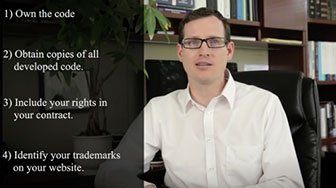PRACTICE AREAS
RATINGS
CONNECT WITH US
VIDEOS
When Should I Update My Will or Trust?
Asking, “When should I update my will or trust?” is a very common question. Looking into this can help protect you, your family members and your assets. Some changes in Life Circumstances may give you cause to update your will, trust, and other estate planning documents. Some examples of these are: birth or adoption of a new family member, children growing up, marriage, divorce, death of a loved one, change in assets, owning a new business, or a move out of state or out of the country.
Birth or Adoption:
Depending on how your current trust is written, it may not automatically include your child. You may need to add the new child as a beneficiary.
Children Growing Up:
As children grow up, what you may have thought was good for them at the creation of your estate planning documents may have changed. If you created the estate plan while your children were young, circumstances have probably changed.
Marriage:
 Assuming your assets automatically transfer to your spouse is dangerous thinking. However, it may not be the case, especially if there was a prior marriage. Items that may cause a need for an update are: children in a prior marriage, assets that are jointly owned, or a prenuptial agreement. A review of your estate plan can assist in carrying out your desires for you and your loved ones.
Assuming your assets automatically transfer to your spouse is dangerous thinking. However, it may not be the case, especially if there was a prior marriage. Items that may cause a need for an update are: children in a prior marriage, assets that are jointly owned, or a prenuptial agreement. A review of your estate plan can assist in carrying out your desires for you and your loved ones.
Divorce:
Divorce will likely cause you to want to update many items in your estate plan. Important documents to update with divorce are: insurance policies, retirement accounts, powers of attorney, existing health care and HIPAA authorizations.
Death:
If a person that was named in your will, trust, and/or estate plan has passed away, update your Estate Plan. Positions that are named in your estate plan are typically executors, designated health care power of attorney or general/financial power of attorney, guardians for your children, or beneficiaries.
Change in Assets:
You may want to update your estate plan if you have had a salary increase, received an inheritance or purchased a large asset.
Business Ownership:
If you have started or acquired a business since you wrote your estate planning documents, you will want to have your estate plan updated. See our blog post entitled, “Does your Company have an Exit Strategy? “.
Move to Another State or Country:
 States have differing legal requirements. You will want to make sure that your will, trust, and estate planning documents conform to the new state’s requirements. If you are living abroad or your have assets in another country it can be tricky, consequently you will need to consult with a professional about your situation. Call our office to discuss.
States have differing legal requirements. You will want to make sure that your will, trust, and estate planning documents conform to the new state’s requirements. If you are living abroad or your have assets in another country it can be tricky, consequently you will need to consult with a professional about your situation. Call our office to discuss.
We are here to help protect you, your loved ones, and your assets. Contact our office to set up your estate planning consultation. We can review your will, trust and other estate planning documents.
If you don’t have a will, trust or estate plan read Top Ten Reasons You Need an Estate Plan.












